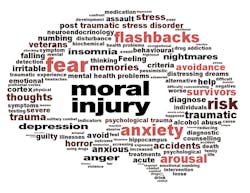Health & Wellness: Beyond PTSD: Moral Injury in First Responders
There’s no doubt that post-traumatic stress disorder (PTSD) is an issue in the fire and emergency services, and the progress that’s been made in this area is important. However, I believe that what affects some first responders runs deeper than just trauma exposure. It’s time that we rip the lid off of what is a significant contributor to the higher rate of suicide that we are experiencing. We cling to PTSD as the culprit, but what most struggle with is something else. It’s called moral injury.
PTSD is a fear-based response, meaning that one’s life feels threatened in some way. It’s an umbrella term that’s used to label the lasting symptoms when the fear-based system is overloaded and compromised. These symptoms can include fear, flashbacks, anger, depression, anxiety, insomnia and nightmares. The disorder is diagnosable.
As a former military wife and caregiver to a veteran who lives with PTSD, I came to know the disorder all too well. I spent 15 years self-educating about it in an attempt to salvage my family. That’s why when I started to experience many of the symptoms in 2016, I knew that I wasn’t experiencing PTSD. So, I sought to identify the “thing” that was taking over every aspect of my life. That’s when I learned about moral injury, and it instantly made sense.
Two differences
At its simplest, moral injury arises when a person who is in a position of authority violates what’s believed to be right in a high-stakes situation (e.g., leadership failures) or when an individual perpetuates, fails to prevent, bears witness to or learns about acts that transgress deeply held moral beliefs and experiences.
As noted by Brett Litz and his colleagues, traditional models of PTSD emphasize stressful events in which the individual is the target of or witness to a hostile act or life-threatening situation. The sense of moral violation is specific to the individual, which makes it difficult to identify and discuss clearly.
Moral injury isn’t a diagnosable psychological disorder, and a person can sustain a moral injury without developing PTSD. However, the aftermath of an unreconciled moral injury closely mirrors PTSD symptoms, with two major differences: the feelings of guilt and shame.
The concept of moral injury initially was developed and studied in the context of combat and veterans, but recent literature correlates similar first-responder outcomes.
Causes
The hallmark effects of a moral injury can be seen in first responders by virtue of the job alone, where we are placed in positions and situations that require decisions that can affect our own or another person’s life severely. Therefore, moral injury is more strongly associated with the emotions that develop after the event rather than during. It damages when the result of a person’s actions doesn’t yield the expected outcome based on training to prevent suffering or the loss of life: for example, being on the RIT team but not saving the life at a mayday or working a textbook pediatric drowning but not reviving the patient. Moral injury isn’t a fear response but, rather, a human response.
What must be more openly addressed is the effect that moral injury has by way of leadership. When we enter this profession, we do so with our own set of moral rules of living that were developed over the course of our life, but we endure an assimilation process. It involves intensive socialization and indoctrination to reorient one’s moral emotions and judgment to that of the organization. This acculturation period capitalizes on moral emotions, such as pride and duty, which act to generate and bind first responders to a sense of self and obligation to public service. The consequence when a person experiences leadership or organizational failures that violate deeply held learned and shared moral expectations is a moral injury.
Most of you have had thoughts or sidebar conversations about your discontentment, frustration or disbelief in the unethical behavior or decisions of people who are in the department. Infractions that challenge your morals are moral injuries. The most common way that we go about coping with these feelings is by disconnecting and, often, self-imposed segregation. First responders practically are ingrained with the understanding that if they speak out (instead of staying quiet) they will be met with retaliation or judgement or be ostracized. Moral injury thrives on one’s silence, and the culture perpetuates it.
The consequences of moral injury go beyond the individual. Because it destroys an individual’s ability to trust others, moral injury infringes on that person’s family and organization, and it pierces a person’s connection with his/her community.
According to Liana Lentz et al in “Compromised Conscience: A Scoping Review of Moral Injury Among Firefighters, Paramedics, and Police Officers,” which was published in Frontiers in Psychology, “When transgressions by peers, leaders, or organizations that betray moral/ethical beliefs occur, it provokes psychological strain and decreased work satisfaction.” Organizational and leadership betrayals are rooted in the perceived bureaucratic attributes of the institution, in feelings of failure to support members or when leadership appears to be incompetent or uncaring. When we learn that we can’t rely on each other or on authority to uphold fundamental moral expectations, we suffer a loss of trust and confidence in people, rules, processes and institutions. These moral betrayals are associated with complex mental health outcomes that are similar to those that are related to trauma. The authors also say that research suggests that the feelings of these betrayals are linked to medical absences for a mental illness, for example the sick callouts by physically well individuals who need “a mental health day.”
Moral injury can be debilitating, preventing affected people from living a full and healthy life. Most importantly, among the military populations, moral injury has been identified as a risk factor for suicide and a suggested linking factor to the dramatic increases in the rates of suicidal thoughts and self-harming behaviors. It creates feelings of hopelessness and burdensomeness, which also are known suicide risk factors in first responders. This can and does occur in those who haven’t experienced a direct life-threatening situation, thus placing significant importance on the whole of the first responder profession to focus on more than just trauma exposure and PTSD.
Solutions
A significant amount of accountability belongs to those who are in a position of leadership. As more responsibility is placed on officers to promote the values of an organization, it’s important to accept that a certain degree of moral obligation comes with that position. Much like the military, firefighters and EMS providers are taught to view commanding officers as the embodiment of their organization’s chosen values, including the commitment to the people who are in their charge. In turn, officers help to make up the moral system that members perceive as safe and reliable. However, many of us experienced or witnessed leaders who violate over and over the same values that we are taught to embody, actuating intense feelings of betrayal. In consequence, the environment that once was perceived to be safe becomes an active threat to one’s survival and belongingness to the larger social group.
In a culture in which many are skeptical of the institution’s motives and decisions, careful consideration that utilizes leaders’ own moral compass should be put toward the rightfulness or wrongfulness of decisions, including disciplinary action or interfering with career aspirations.
Speak up
Although PTSD and moral injury share a lot of the same symptoms, the treatment modalities are different.
Understanding moral injury is of the utmost importance then, particularly in regard to members who don’t appear to be benefiting from traditional PTSD treatments. So, if you’re dealing with any of the feelings that I described, be open and honest with your therapist about what you are feeling. Bring up the idea of moral injury, instead of trying to fit yourself into a diagnosis. After all, this is your recovery journey.
For others, there is no shame in needing and asking for help. If you are suffering because of a moral injury, talk to someone who you trust, who earned the right to hear you, because the conversation isn’t nearly as dangerous as your silence.
About the Author

Michelle Fayed
Michelle Fayed is a firefighter/paramedic and 23-year veteran of the fire service. She is the statewide family/caregiver support coordinator for the Florida Firefighter Safety and Health Collaborative. Fayed is a national trainer for Mental Health First Aid USA and content developer of the organization’s fire/EMS specialty module. At the request of the National Council for Mental Wellbeing, she advocated for support and funding of mental health awareness education at Congressional staff briefings in Washington, D.C. Fayed has spoken about mental health, post-traumatic stress disorder and moral injury in the emergency services at numerous local, regional and national conferences.

